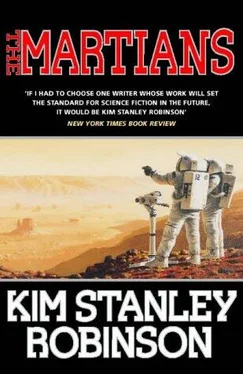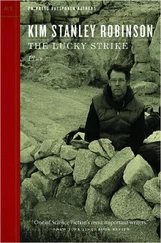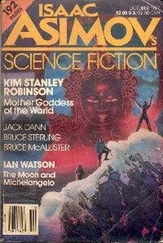Nirgal walked around and through it, suddenly aware of the silence. There was no wind, no sound of bird or beast. All was in shadow; the world had stopped. Apollo might step out of the gloom. Something reminded him of Zygote; perhaps simply the white of the columns, somewhat like Zygote’s dome, back there in his past which now seemed to him like a fairy tale from another age, a tale with a child hero and an animal mother. The notion that that fairy tale and the moment he lived in were parts of the same life—his life—it took a leap of faith that he was incapable of making. Hard to imagine how it would feel a century or two on, in other words what it felt like now for Nadia and Maya and the rest of the issei. . . .
Something moved and he jumped. But it was nothing. He shook his head, touched the smooth cool surface of a column. A human mark in the forest. Human marks, both temple and forest. In this ancient eroded crater.
Two old people appeared across the clearing, walking to the temple, unaware of Nirgal. His heart leaped in him like a child trying to escape—
But they were strangers. He had never seen them before. Old men; Caucasian; bald; wrinkled; one short, the other shorter.
Both now looking at him suspiciously.
“Hello!” he said.
They approached, one pointing a dart gun at the ground.
He said, “What is this place?”
One stopped, held the other back by the arm. “Aren’t you Nirgal?”
Nirgal nodded.
They glanced at each other.
“Come back to our place,” the same one said. “We’ll tell you there.”
They hiked up through the woods covering the old crater wall, to the edge of the crater, where stood a little cottage, constructed of logs, roofed by dark red slates. The men led Nirgal into this home of theirs, Nirgal ducking under the lintel.
It was dim inside. One window overlooked the crater. The tops of the monument’s pillars were visible in the treetops.
They served Nirgal an odd herb tea, made from a kind of pond weed. They were issei, they said—not only issei, but members of the First Hundred. Edvard Perrin and George Berkovic. Edvard did most of the talking. Friends, they were. And colleagues of Phyllis Boyle. The monument in the crater was a memorial to her. The three of them had built a similar structure long ago, out of ice drums, for fun. On the first trip to the North Pole, with Nadia and Ann, in m-year 2.
“In the beginning,” George added with a flinty smile.
They told him their story, and he saw it had once been oft-repeated. Edvard told most of it, with George adding comments, or finishing some of Edvard’s trailing sentences.
“We were there when it all came down. There wasn’t any reason for it. They screwed it up when it all could have been so easy. I’m not saying we’re bitter, but we are. 2061 wasn’t necessary.”
“It could have been avoided, if they had listened to Phyllis. It was all Arkady’s fault.”
“Bogdanov’s stupid confidence. Whereas Phyllis had a plan that would have worked fine, without all the destruction and death.”
“Without the war.”
“She saved us all when we were marooned on Clarke. After saving everyone on Mars before that.”
They glowed dimly as they remembered her. Happy to have their tale to tell. They had survived ’61, they had worked for peace in the years between revolutions, helping UNTA in Burroughs to coordinate mining efforts in Vastitas, sequencing them so that sites in danger of inundation by the north sea were strip-mined with enormous speed before the ice and water buried them. Those were the glory years, a moment in history when the tremendous power of technology could be wielded on the landscape without consequences—no environmental impact statements, no scars that would last . . . billions of dollars of metals extracted before the ice overwhelmed the sites.
“That was when we found this place,” George said.
“Amazonia was full of metals,” Edvard added. “No way we got it all out.”
“And now, of course,” Edvard said, and sipped his tea.
Silence fell. George poured more tea, and Edvard began again.
“We were in Burroughs when the second revolution began, working for UNTA. Phyllis was dead at that point. Killed by red terrorists.”
“In Kasei.”
Nirgal kept his face still.
They watched him.
“Maya, in fact. Maya killed Phyllis. So we have heard.”
Nirgal stared back at them, sipping his tea.
They gave up the gambit. “Well, it’s well-known. She was certainly capable of it. She would be the one to do it. Murderous. I’m still sick about it. Sick.”
“I can’t believe it happened.”
“I sometimes wonder if it did. If maybe Phyllis got away and disappeared, like Hiroko is supposed to have. They never did find her body. I never saw it. We opposed Free Mars, we opposed you.” Glancing defiantly at him as he said it.
“We despised the red guerrillas. At least until—”
“But our special hatred is reserved for our crèche-mates, isn’t it.”
“It’s always that way.”
“Nadia, Sax, Maya—death and mass destruction. That’s all they brought us with their so-called ideals. Death and mass destruction.”
“Not your fault,” George told Nirgal.
“But if Phyllis had lived . . . We were in Burroughs during the protests. The standoff with UNTA. The flooding of the city—the deliberate flooding of the greatest city on Mars! Phyllis would never have let that happen.”
“We were on the planes that evacuated.”
“Five planes, five giant planes. We flew to Sheffield. So we were there for that one too. Death and destruction. We tried to mediate. We tried to do what Phyllis would have done.”
“Tried to mediate.”
“Yes, to mediate, between UNTA and the reds. It was impossible, but we did it. We did it. The cable would have gone twice if it weren’t for us. It’s a monument to Phyllis just as much as our little gazebo down there. She was the first advocate of the elevator. A visionary. So we did what we could.”
“After the truce we went east.”
“By piste where it was still possible. In rovers where it wasn’t. We separated at Underhill, didn’t we.”
“And met again on Elysium. But only after the most amazing adventures I’ve ever heard of.”
“Crossing the north sea ice.”
“Slipping across the bridge over La Manche.”
“Walking all the way across the Hump. Finally we reunited, here, and helped to build Cimmeria Harbor. Lobbying all the while for the name Boyle Harbor, to match Boone Harbor in Tempe.”
“And all the places named Bogdanov.”
“But no such luck. She’s a forgotten hero. But someday justice will be done. History will judge. Meanwhile we’re helping to establish Cimmeria, and doing some prospecting in the forest.”
Nirgal said, “Ever hear anything of Hiroko?”
They looked at each other. Nirgal had no idea what their glances meant, but there was quite a silent conversation going on between them.
“No. Hiroko . . . she disappeared so long ago. We never heard from her again. But she’s your mother, no?”
“Yes.”
“You don’t hear from her?”
“No. She disappeared in Sabishii. When UNTA burned it down.” Reminding them. “Some say she was killed then. Others say that she got away with Iwao and Gene and Rya and the rest of them. Lately I heard they may have come to Elysium. Or to somewhere near here.”
They frowned. “I’ve never heard that, have you?”
“No. But they wouldn’t have told us, would they.”
“No.”
“But you’ve seen nothing out here,” Nirgal said. “No settlements or camps?”
“No. Well . . .”
“There are settlements all over. But they all come into town. They’re all natives like you. A few Kurds.”
Читать дальше
Конец ознакомительного отрывка
Купить книгу












